
The Benefits of the Last Three Ayahs of Surah Baqarah
Surah Al-Baqarah, the second chapter of the Quran, is the longest chapter in the holy book, consisting of 286 verses. Towards its conclusion, however, lies a profound set of three verses that hold immense significance for Muslims worldwide. These verses, known as the last three Ayahs of Surah Baqarah, are revered for their profound meanings, blessings, and protective properties.
The Arabic Text and English Translation
Here are the last three Ayahs of Surah Baqarah along with their Arabic text and English translation:
Ayah 284: “لِّلَّهِ مَا فِي السَّمَاوَاتِ وَمَا فِي الْأَرْضِ ۗ وَإِن تُبْدُوا مَا فِي أَنفُسِكُمْ أَوْ تُخْفُوهُ يُحَاسِبْكُم بِهِ اللَّهُ ۖ فَيَغْفِرُ لِمَن يَشَاءُ وَيُعَذِّبُ مَن يَشَاءُ ۗ وَاللَّهُ عَلَىٰ كُلِّ شَيْءٍ قَدِيرٌ”
“To Allah belongs whatever is in the heavens and whatever is in the earth. Whether you show what is within yourselves or conceal it, Allah will bring you to account for it. Then He will forgive whom He wills and punish whom He wills, and Allah is over all things competent.”
Ayah 285: “آمَنَ الرَّسُولُ بِمَا أُنزِلَ إِلَيْهِ مِن رَّبِّهِ وَالْمُؤْمِنُونَ ۚ كُلٌّ آمَنَ بِاللَّهِ وَمَلَائِكَتِهِ وَكُتُبِهِ وَرُسُلِهِ لَا نُفَرِّقُ بَيْنَ أَحَدٍ مِّن رُّسُلِهِ ۚ وَقَالُوا سَمِعْنَا وَأَطَعْنَا ۖ غُفْرَانَكَ رَبَّنَا وَإِلَيْكَ الْمَصِيرُ”
“The Messenger has believed in what was revealed to him from his Lord, and [so have] the believers. All of them have believed in Allah and His angels and His books and His messengers, [saying], ‘We make no distinction between any of His messengers.’ And they say, ‘We hear and we obey. [We seek] Your forgiveness, our Lord, and to You is the [final] destination.'”
Ayah 286: “لَا يُكَلِّفُ اللَّهُ نَفْسًا إِلَّا وُسْعَهَا ۚ لَهَا مَا كَسَبَتْ وَعَلَيْهَا مَا اكْتَسَبَتْ ۗ رَبَّنَا لَا تُؤَاخِذْنَا إِن نَّسِينَا أَوْ أَخْطَأْنَا ۚ رَبَّنَا وَلَا تَحْمِلْ عَلَيْنَا إِصْرًا كَمَا حَمَلْتَهُ عَلَى الَّذِينَ مِن قَبْلِنَا ۚ رَبَّنَا وَلَا تُحَمِّلْنَا مَا لَا طَاقَةَ لَنَا بِهِ ۖ وَاعْفُ عَنَّا وَاغْفِرْ لَنَا وَارْحَمْنَا ۚ أَنتَ مَوْلَانَا فَانصُرْنَا عَلَى الْقَوْمِ الْكَافِرِينَ”
“Allah does not burden a soul beyond that it can bear. It will have [the consequence of] what [good] it has gained, and it will bear [the consequence of] what [evil] it has earned. ‘Our Lord, do not impose blame upon us if we have forgotten or erred. Our Lord, and lay not upon us a burden like that which You laid upon those before us. Our Lord, and burden us not with that which we have no ability to bear. And pardon us; and forgive us; and have mercy upon us. You are our protector, so give us victory over the disbelieving people.'”
As Muslims, learning how to read the Quran is of utmost importance. If you can’t recite the Quran or if you want to improve your Quran recitation, we offer Quran recitation with Tajweed course that will help you start learning and perfect your Quran recitation. Sign up for free trials now.
Significance of the Last 3 Ayahs of Surah Baqarah
1. Universal Sovereignty of Allah: The first of these three verses emphasizes the absolute sovereignty of Allah over all creation. It underscores the omnipresence of divine knowledge and indicates that nothing escapes His awareness, whether it is openly expressed or concealed within the hearts of individuals.
2. Faith and Belief: The second verse highlights the unifying principles of faith shared by the believers. It emphasizes the belief in Allah, His angels, His books, and His messengers. Moreover, it underscores the principle of obedience and seeking forgiveness from Allah, acknowledging Him as the ultimate destination.
3. Mercy and Forgiveness: The final verse reassures believers of Allah’s mercy and compassion. It emphasizes the concept of divine justice tempered with mercy, asserting that Allah does not burden any soul beyond its capacity. It also serves as a supplication seeking forgiveness, guidance, and mercy from Allah.
4. Protection and Victory: Collectively, these verses offer solace, guidance, and a sense of protection to the believers. They serve as a reminder of Allah’s benevolence, mercy, and forgiveness, instilling hope and resilience in the hearts of those who recite and reflect upon them.
5. Protective Properties: Muslims often recite these verses for their protective properties. It is believed that reciting these verses before sleeping or embarking on a journey can offer spiritual protection and blessings. Many also recite them during times of distress or difficulty, seeking solace in the profound words and seeking Allah’s mercy and guidance.
Parting Remarks
The last three Ayahs of Surah Al-Baqarah hold profound significance for Muslims worldwide. They encapsulate fundamental principles of faith, mercy, and divine protection. These verses affirm the universal sovereignty of Allah, emphasize the unifying beliefs of believers, and reassure them of Allah’s mercy and forgiveness. Serving as a source of solace and guidance, these Ayahs offer spiritual protection and blessings to those who recite and reflect upon them.